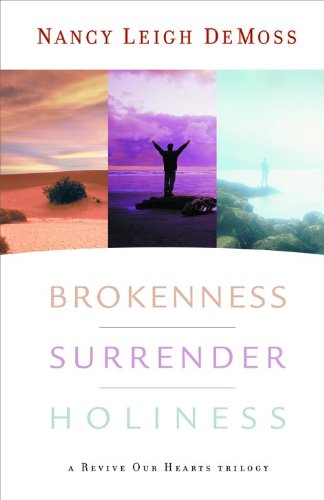Quotes about Brokenness
God is not looking for the powerful and the successful and those who are able communicators. Instead, He looks for the person who has a broken and contrite spirit. Those individuals, whether they are extroverted or introverted, humorous or melancholy, are regularly in the quiet place bowing before God’s Word with a trembling heart and seeking fresh enabling from the Holy Spirit. They have been brought to see that they did not make themselves, nor did they save themselves. They are totally dependent upon God’s grace (Isa. 66:2).
Made For His Pleasure, Moody Press, 1996, p. 164. Get this book!
A strong meditation on Christ will excite compassion for His sufferings, but a detestation of our sins and selves as the cause of them. It is a look upon Christ pierced, that pierces the soul, Zechariah 12:10.
True brokenness is a lifestyle – a moment-by- moment lifestyle of agreeing with God about the true condition of my heart and life – not as everyone else thinks it is but as He knows it to be.
Brokenness, The Heart God Revives, Moody Publishers, 2002, p. 53. Get this book!
Brokenness is the shattering of my self-will – the absolute surrender of my will to the will of God. It is saying “Yes, Lord!” – no resistance, no chafing, no stubbornness – simply submitting myself to His direction and will in my life.
Brokenness is the stripping of self-reliance and independence from God. The broken person has no confidence in his own righteousness or his own works, but he is cast in total dependence upon the grace of God working in and through him.
Brokenness, The Heart God Revives, Moody Publishers, 2002, p. 54. Get this book!
Unbroken people…cannot rejoice over repentant sinners. They are consumed with a sense of their own rights and expectations. And if they don’t get the treatment they feel they deserve, they throw a pity party for themselves.
Brokenness, The Heart God Revives, Moody Publishers, 2002, p. 79. Get this book!
Proud people keep others at arm’s length. Broken people are willing to take the risks of getting close to others and loving intimately.
Brokenness, The Heart God Revives, Moody Publishers, 2002, p. 94. Get this book!
Jesus said, “Blessed are the poor in spirit” – contrary to what we would expect, brokenness is the pathway to blessing! There are no alternative routes; there are no short-cuts. The very thing we dread and are tempted to resist is actually the means to God’s greatest blessings in our lives.
Brokenness, The Heart God Revives, Moody Publishers, 2002, p. 105. Get this book!
The Word, circumstances, and other believers – these can all be tools to show us our need and create opportunities to choose the pathway of brokenness. The Spirit of God is the arm that wields each of these instruments to bring us to a point of brokenness. However, we must respond to His initiative.
Brokenness, The Heart God Revives, Moody Publishers, 2002, p. 131. Get this book!
Proud people focus on the failures of others and can readily point out those faults. Broken people are more conscious of their own spiritual need than of anyone else’s.
Brokenness, The Heart God Revives, Moody Publishers, 2002, p. 88. Get this book!
Proud people have a feeling – conscious or subconscious – that “this ministry is privileged to have me and my gifts.” They focus on what they can do for God. Broken people have a heart attitude that says, “I don’t deserve to have any part in this ministry”; they know that they have nothing to offer God except the life of Jesus flowing through their broken lives.
All gracious affections that are a sweet odor to Christ, and that fill the soul of a Christian with a heavenly sweetness and fragrancy, are broken-hearted affections.
Our wills must be broken to His will. To be broken is the beginning of revival. It is painful, it is humiliating, it is the only way. It is being ‘Not I, but Christ,’ and a ‘C’ is a bent ‘I.’ The Lord Jesus cannot live in us fully and reveal Himself through us until the proud self within us is broken. This simply means that the hard unyielding self, which justifies itself, wants its own way, stands up for its rights, and seeks its own glory, at last bows its head to God’s will, admits it’s wrong, gives up its own way to Jesus, surrenders its rights and discards its own glory – that the Lord Jesus might have all and be all. In other words, it is dying to self and self-attitudes.
The Calvary Road, Christian Literature Crusade, 1950, p. 21-22. P.O. Box 1449, Fort Washington, PA 19034-8449. Used by Permission.
This is ever the nature of true confession of sin, true brokenness. It is the confession that my sin is not just a mistake, a slip, a something which is really foreign to my heart (“Not really like me to have such thoughts or do such things!”), but that it is something which reveals the real ‘I’; that shows me to be the proud, rotten, unclean thing God says I am; that it really is like me to have such thoughts and do such things. It was in these terms that David confessed his sin, when he prayed, “Against Thee, Thee only, have I sinned and done this evil in Thy sight, that Thou mightest be justified when Thou speakest and be clear when Thou judgest” (Psalm 51:4).
The Calvary Road, Christian Literature Crusade, 1950, p. 107. P.O. Box 1449, Fort Washington, PA 19034-8449. Used by Permission.
Brokenness in daily experience is simply the response of humility to the conviction of God.
The Calvary Road, Christian Literature Crusade, 1950, p. 23. P.O. Box 1449, Fort Washington, PA 19034-8449. Used by Permission.
To be broken means to have no rights before God and man. It does not mean merely surrendering my rights to Him but rather recognizing that I haven’t any, except to deserve hell. It means just being nothing and having nothing that I call my own, neither time, money, possessions nor position.
The Calvary Road, Christian Literature Crusade, 1950, p. 48. P.O. Box 1449, Fort Washington, PA 19034-8449. Used by Permission.
In order to break our wills to His, God brings us to the foot of the Cross and there shows us what real brokenness is. We see those wounded Hands and Feet, that Face of Love crowned with thorns and we see the complete brokenness of the One who said, “Not My will, but Thine be done,” as He drank the bitter cup of our sin to its dregs. So the way to be broken is to look on Him and to realize it was our sin which nailed Him there. Then as we see the love and brokenness of the God who died in our place, our hearts will become strangely melted and we will want to be broken for Him and we shall pray, “Oh, to be saved from myself, dear Lord, Oh, to be lost in Thee, Oh, that it might be no more I, But Christ that lives in me.” And some of us have found that there is no prayer that God is so swift to answer as the prayer that He might break us.
The Calvary Road, Christian Literature Crusade, 1950, p. 48. P.O. Box 1449, Fort Washington, PA 19034-8449. Used by Permission.
It is when believers are out of answers, confidence, and strength, with nowhere else to turn but to God that they are in a position to be most effective. No one in the kingdom of God is too weak to experience God’s power, but many are too confident in their own strength. Physical suffering, mental anguish, disappointment, unfulfillment, and failure squeeze the impurities out of believers’ lives, making them pure channels through which God’s power can flow.
The broken person…will find that all of the resources of heaven and all of the Spirit’s power are now at his disposal and, unless heaven’s riches can be exhausted or the Spirit’s power can be found wanting, he cannot come up short (Jennifer Kennedy Dean).
He Restores My Soul: A Forty-Day Journey Toward Personal Renewal, Broadman and Holman, 1999, p. 27.
Let my heart be broken with the things that break the heart of God.
I think of Peter after He denied the Lord. The Bible says, “He went out and wept bitterly” (Lk. 22:62). Psalm 38:18, “For I confess my iniquity; I am full of anxiety because of my sin.” Jeremiah 31:18, “I have surely heard Ephraim grieving, ‘You have chastised me, and I was chastised, like an untrained calf; bring me back that I may be restored, for You are the LORD my God.’” In the Beatitudes our Lord said, “Blessed are those who mourn, for they shall be comforted” (Mt. 5:4). In 2 Corinthians 7, Paul spoke of a “godly sorrow.” In the depths of your relationship with God have you ever experienced this? When we sin against God we should experience our most intense grief. In verse 3 of Psalm 6, David speaks of His soul being “greatly dismayed.”
When have you most recently felt the crushing pain of a burdened heart, darkened soul or guilty conscience solely because of your sin against God? Does sin hurt you as much as it hurts God? Does it make you sick, grieved or disappointed? Does it weigh on you prompting repentance and calling to God for restoration? Do you ever feel that your sin has divided you from a rich relationship with God and the feeling is one of emptiness, despair and regret?
What does in mean to be spiritually poor? It means to be humble. It means to understand that you have no merit to offer to God. It means to understand that all you deserve is hell. It means to understand that you are spiritually bankrupt. It means to understand the unfathomable riches of Christ that by God’s sovereign grace have been accredited to your account. It means to boast not in yourself, but in Christ. It means emptying yourself of all your pride that the Holy Spirit might fill you with all of Christ… The humble pursuit of spiritual poverty is the path to true happiness. Empty of self, filled with the Holy Spirit and His fruit of joy.
Learn this lesson: not to trust Christ because you repent, but trust Christ to make you repent; not to come to Christ because you have a broken heart, but to come to Him that He may give you a broken heart; not to come to Him because you are fit to come, but to come to Him because you are unfit to come. Your fitness is your unfitness. Your qualification is your lack of qualification.
A heart crushed is a fragrant heart. Men contemn those who are contemptible in their own eyes, but the Lord sees not as man sees. He despises what men esteem, and values that which they despise. Never yet has God spurned a lowly, weeping penitent, and never will he while God is love, and while Jesus is called the man who receives sinners. Bulls and rams He desires not, but contrite hearts He seeks after.
To injure our fellow men is sin, mainly because in so doing we violate the law of God. The penitent’s heart so filled with a sense of the wrong done to the Lord Himself, that all other confession swallowed up in a broken-hearted acknowledgment of offense against [God].
Remorse, regret, sorrow, and the pain provoked by sin will only increase and intensify the longer we are Christians. Maturity in the faith does not lead to less sorrow over sin, but more. The pain does not diminish; it deepens.
Self-sufficient Christians are weak, easily deceived, ineffective in service, easily angered, over-confident, and ruled by their emotions. Insufficient Christians, who know they can do nothing outside the power and strength that Christ gives, are actually strong, because the power of God flows through their utter dependence on Him.
Godly sorrow and worldly sorrow. The first one leads to life, but the latter shoves us into a spiritual grave. Worldly sorrow only bemoans getting caught or weeps for what was lost. It never grieves for the wrong committed. Godly sorrow produces different results. When we experience godly sorrow, we are deeply grieved for the wrong we committed. We desire to ask forgiveness, to repair the damage, to make reparation for the harm done; not merely to protect ourselves from pain or regain what we didn’t want to give up. In a word, we repent.
Getting Past Guilt: Overcoming Barriers to Feeling Forgiven. See more at: http://www.insight.org/resources/articles/encouragement-healing/getting-past-guilt.html?referrer=https://www.google.com/#sthash.Pk5C35Qn.dpuf.
When you come to the end of yourself, you find the beginning of God.













